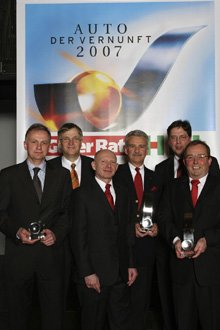 The editors of the German magazine Guter Rat have awarded a prize to Volkswagen in a category labeled Innovation of reason for their work on high temperature fuel cells. Professor Jürgen Leohold, Head of Volkswagen Group Research accepted the award last Friday in Berlin. The work done by VW has resulted in a new type of membrane for the fuel cell that helps to increase the efficiency of the fuel cell. As a result, the cell can be made significantly smaller and less expensive. The new fuel cell should appear in prototype vehicles 2010 with production hopefully expected by 2020. The VW press release is after the jump
The editors of the German magazine Guter Rat have awarded a prize to Volkswagen in a category labeled Innovation of reason for their work on high temperature fuel cells. Professor Jürgen Leohold, Head of Volkswagen Group Research accepted the award last Friday in Berlin. The work done by VW has resulted in a new type of membrane for the fuel cell that helps to increase the efficiency of the fuel cell. As a result, the cell can be made significantly smaller and less expensive. The new fuel cell should appear in prototype vehicles 2010 with production hopefully expected by 2020. The VW press release is after the jump
[Source: Volkswagen]
"Innovation of reason" 2007: Award for high temperature fuel cell from Volkswagen
Wolfsburg, 26 March 2007 - The high temperature fuel cell from Volkswagen has been awarded a prize in the special category "Innovation of reason" by the largest German consumer magazine "Guter Rat". The jury of editing staff thereby afforded Volkswagen credit for their breakthrough in fuel cell technology. The prize was accepted last Friday by Professor Jürgen Leohold, Head of Volkswagen Group Research, at the Meilenwerk in Berlin.
"I am very happy to accept this award as a representative from my research team. We pursued fundamental research and with the very promising results were able to markedly influence the path for fuel cell technology", research boss Leohold said during the award ceremony.
In the last eight years, research experts from Volkswagen have developed a new type of membrane as the core element of the fuel cell. This makes it possible to construct a smaller, more efficient and better value for money system overall. The main modifications are: new high temperature membrane on phosophorous basis and likewise newly designed eletrodes. This enables fuel cells to be operated over a long period of time at temperatures of 120 degrees Celcius - without any power loss, without humidification and with no irreparable damage to the cells. The special feature is that the high temperature membrane uses phosphorus acid instead of water for energy generation.
The first vehicle prototypes that use this high temperature technology could be around by about 2010. Series production of this future technology is not expected before 2020.


Sign in to post
Please sign in to leave a comment.
Continue